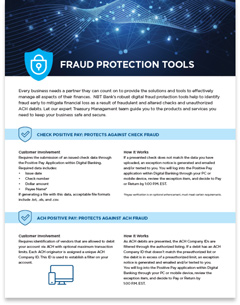Recommendations on how to Protect Your Business
When it comes to businesses, security starts internally. As financial data and information dangers grow, taking a few simple steps within your organization can go a long way in protecting it from outside threats. Click the headings below to learn what you can do.
If you don’t currently have formal computer security procedures in place, your business is unnecessarily at risk. It’s important to establish basic security procedures and controls for your business and to update and distribute these to all employees on a regular basis. Here are some important measures to put in place:
- Reconcile all banking transactions on a daily basis
- Initiate electronic transactions (such as payroll and wire transfers) under dual control
- Prohibit the use of “shared” usernames and passwords
- Use a different password for each website that is accessed
- Never access websites from a link in an e-mail, especially if personal information is requested
- Do not include personal or sensitive data in response to an e-mail
One of the most important things you can do is safeguard your sensitive business and financial data. Here are some simple steps that will help get you started in protecting your most valuable information:
- Install commercial antivirus software on all computer systems
- Ensure virus protection and security software are updated regularly
- Consider installing spyware detection programs
- Be suspicious of e-mails pretending to be from financial institutions, government agencies or other organizations requesting account information, account verification or banking-access credentials
- Never share usernames or passwords with third-party vendors
- Limit administrative rights on users’ workstations
- Perform all online banking activities from a stand-alone computer system from which e-mail and web browsing are not possible
- When conducting online banking, make sure your browser is operating in a secure session (indicated in the web address bar by "https")
- Avoid using automatic login features that save usernames and passwords for online banking
- Never leave a computer unattended while using any online banking or brokerage service
- Never access bank, brokerage or other financial services information at Internet cafés, public libraries, etc. Unauthorized software may have been installed to trap account login information, leaving you open to potential fraud
- Regularly clear your web browser’s "history" in order to eliminate copies of web pages that have been stored on your hard drive
You and your employees are the first line of defense against corporate account takeover. A strong security program paired with employee education about the warning signs, safe practices, and responses to a suspected takeover are essential to protecting your company and customers.
It is important to protect your cyber environment just as you would your cash and physical location. Do not use unprotected Internet connections. Encrypt sensitive data and keep updated virus protections on your computer. Use complex passwords and change them periodically.
Talk to us about programs that safeguard you from unauthorized transactions. Positive Pay and other services offer call backs, device authentication, multi-person approval processes and batch limits to help protect you from fraud.
Look out for unexplained account or network activity, pop-ups, and suspicious emails. If detected, immediately contact your financial institution, stop all online activity and remove any systems that may have been compromised. Keep records of what happened.
The account agreement with your bank will detail what commercially reasonable security measures are required in your business. It is critical that you understand and implement the security safeguards in the agreement. If you don't, you could be liable for losses resulting from a takeover. Talk to us if you have any questions about your responsibilities.





